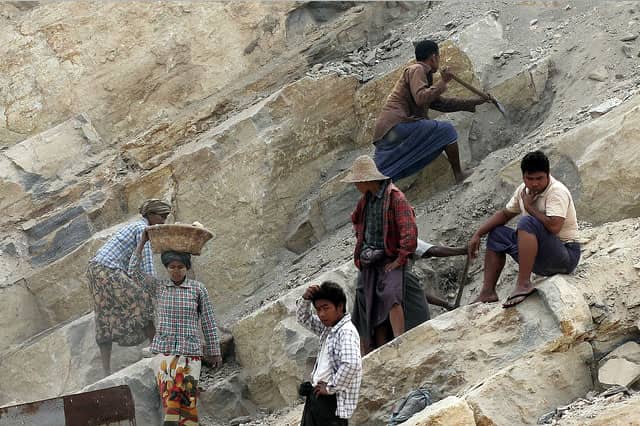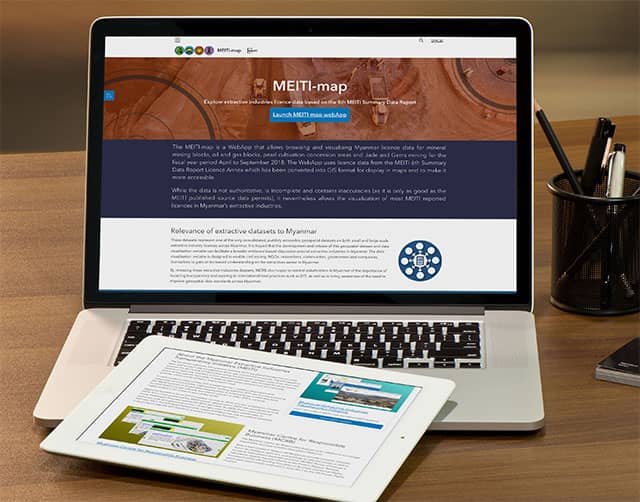A New Mineral Resources Policy and Fresh Laws are Needed if Mining in Myanmar is ever to be Sustainable

MCRB) today published a sector-wide impact assessment (SWIA) on the mining sector, with field research focussed on tin, gold and limestone mining in eight states and regions. This is the fourth SWIA by MCRB.
Five main challenges for achieving responsible mining in Myanmar were identified from the field research, as well as from extensive review of current laws and initiatives. This included discussion with international and local experts, including those providing advice to the Myanmar government, as well as mining companies. The five challenges are:
-
Policies, laws and regulations relevant to mining activities lack clarity and inhibit responsible investment
-
The capacity of government and business actors to monitor and address environmental, social and human rights impacts of mining is limited
-
The environmental, social and human rights costs of mining are externalised on local communities
-
Governance of mining in conflict-affected areas is highly problematic
-
Extensive informality in the mining sector needs to be addressed
Speaking today at the launch of the assessment in Yangon, Vicky Bowman, Director of MCRB said:
The development of mining sector regulation in Myanmar has taken place over the last two decades, but is still based on a 1994 Mining Law which is now outdated. The legal framework is also fragmented between mining and gemstones. The 2015 Amendments to the Mining Law only made minor changes; and the 2018 Rules, since they are based on that amended Law, can also only tinker at the edges.
The entire approach to mining in Myanmar needs a rethink. Our field team observed so many negative impacts when undertaking the research for this assessment. Most of the harms were felt by workers – including women and children - and born by the environment. A rethink is also needed if Myanmar is to develop the modern Mineral Rights Cadaster it needs to meet EITI standards. A fresh start, a clear policy vision, and simple laws to underpin it, are essential if mining is ever to contribute to sustainable development in Myanmar.
In the SWIA, we recommend that the government embark on a transparent and consultative process to develop the National Mineral Resources Policy which they are currently considering. Ideally the policy should be cross-governmental, and should cover all minerals including gemstones. It should be designed to support peace and effective natural resource federalism. There is plenty of international expertise and experience to draw on. The Policy can then serve as a basis for a complete overhaul of all the laws relating to mining to set the sector on a sustainable path.
Claus Teilmann Petersen, the Director for Human Rights and Development at the Danish Institute for Human Rights, one of MCRB’s founding organisations, which provided expert advice on the SWIA attended the SWIA launch in Yangon. He added:
It is welcome that the Myanmar government is seeking to formalise artisanal and subsistence mining (ASM) rather than outlaw it. Although ASM has significant negative impacts on human rights and the environment, it also benefits thousands of poor people.
Formalising artisanal mining is a difficult task. It can’t simply be addressed by a new set of rules on licencing. But as there are other countries which have gone down that track, they can provide lessons learned to Myanmar. One lesson for putting together an effective Artisanal and Subsistence Mining (ASM) Management Strategy is that governments need to consult with all stakeholders, including the subsistence miners themselves. Their right to livelihood will be affected by an approach which doesn’t take the specific nature of ASM into account.
The Mining SWIA is based on both desk-based and field research in Mandalay, Sagaing, Bago and Tanintharyi Regions, and Shan, Kayah, Kachin and Kayin States, concerning gold, tin and limestone mining which took place in 2016. It includes in-depth analysis of existing Myanmar policy and legal frameworks relevant to the mining sector, including frameworks on investment, environment and safety, as well as the historical, political and economic context.
Economic, governance, and environment social and human rights impacts are examined at sectoral level. Local project-level and cumulative impacts are examined concerning communities, land, labour and safety, women and children, conflict and security, and environmental and ecosystems services.
The SWIA makes recommendations to government, companies, ethnic armed organisations, civil society organisations and other governments.
Summary of Recommendations in the Mining SWIA
Recommendations to the Government of Myanmar
-
Adopt a National Mineral Resources Policy; use it as the basis for new mining legislation, and for ensuring Myanmar’s mineral resources benefit local people and do not drive continued conflict
-
Simplify and align mining, investment, environmental and safety permitting, and the legislation which underpins it
-
Address gaps and inconsistencies in environmental and social safeguards for mining
-
Improve enforcement of laws and permit obligations
-
Strengthen processes for judicial and non-judicial remedy
-
Enhance public participation and transparency
-
Take steps towards formalising subsistence mining and reducing harmful practices
Recommendations to Companies in the Mining Sector
-
Commit to applying international standards of responsible business conduct
-
Implement human rights due diligence
-
Identify and mitigate adverse impacts
-
Implement heightened due diligence in conflict-affected areas
-
Establish an operational-level grievance mechanism for each mine
-
Engage with stakeholders, particularly workers and communities
-
Develop local content, supply chains and community capacity
-
Support the formalisation of informal and subsistence mining
-
Take collective action to improve responsible mining practices
Recommendations to Ethnic Armed Organisations
-
Develop EAO approaches to mining policy and permitting
-
Improve governance of, and standards at, EAO-permitted mining operations
-
Protect the rights of communities affected by mining
Recommendations to Civil Society Organisations
-
Support local communities impacted by mining so that negative impacts are prevented or mitigated, and they obtain remedy
-
Advocate for relevant legal and policy reforms
-
Participate in multi-stakeholder initiatives and make use of the data and dialogue opportunities they offer
Recommendations to Development Partners
-
Provide technical assistance to strengthen environmental and social safeguards in mining
-
Provide technical assistance to formalise subsistence mining
-
Support EAOs to address impacts of unsustainable mining in conflict-affected areas
-
Encourage foreign investors to invest responsibly in Myanmar
Read also
- Mining Sector
- Jade Mining in Kachin State – Environmental Management Plans
- Towards Responsible Gold Mining in Sagaing Region
- River Sand Extraction in Myanmar
- Experts object to firms’ plans to mine sand in Tanintharyi Region
 English
English မြန်မာ
မြန်မာ မြန်မာ (unicode)
မြန်မာ (unicode)
















